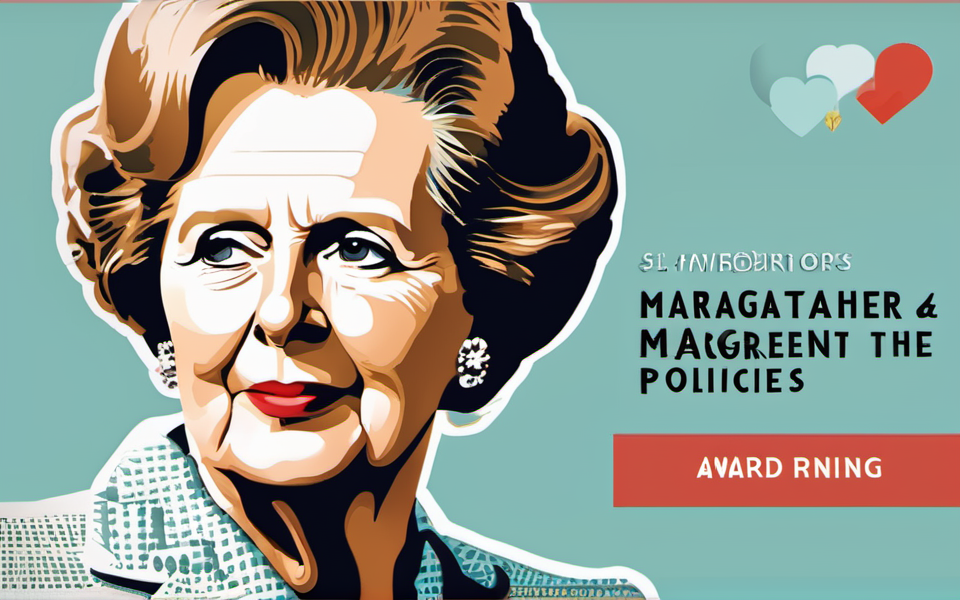Ever wonder how one woman reshaped an entire country’s economy? Dive into the story of Margaret Thatcher and discover the magic (and controversy) behind her economic wizardry!
The Iron Lady Takes the Helm
When Margaret Thatcher became the Prime Minister of the United Kingdom in 1979, the country was facing serious economic challenges. Inflation was high, unemployment was rising, and the British economy was in a slump. Many people were skeptical about whether Thatcher could turn things around, but she was determined to prove them wrong.
Thatcher’s approach was bold and uncompromising. She believed in a free-market economy, where businesses and individuals had the freedom to make their own decisions. This was in stark contrast to the existing policies, which involved heavy government intervention and public ownership of many industries. Thatcher’s first step was to cut government spending and reduce taxes, hoping that this would stimulate economic activity and attract investment.
Her policies were controversial from the start. Some people praised her for taking decisive action, while others accused her of being too harsh and cutting essential services. But for better or worse, the Iron Lady was steadfast in her beliefs and ready to fight for her vision of a prosperous Britain.
Privatization: Selling Off the State
One of Thatcher’s most well-known policies was the privatization of state-owned industries. She believed that privatization would lead to increased efficiency, greater innovation, and improved customer service. Companies like British Telecom, British Gas, and British Airways were sold off to private investors, making Thatcher’s government billions of pounds in revenue.
Critics argued that privatization led to job losses and reduced control over essential services. They claimed that it benefited the wealthy while leaving the working class to struggle. Supporters, on the other hand, pointed to the improved performance and profitability of these industries as evidence that Thatcher’s strategy was working.
Privatization also aimed to create a “share-owning democracy,” where ordinary people could buy shares in these newly privatized companies. This was intended to give individuals a greater stake in the economy and encourage more investment. While the concept was popular, it didn’t always succeed in practice. Still, the idea of reducing state involvement in the economy became a key feature of Thatcher’s legacy.
The Battle Against Inflation
Inflation was a major concern for Thatcher, and she was determined to bring it under control. Her government employed strict monetary policies, including raising interest rates and controlling the money supply. These measures were designed to curb spending and reduce the amount of money circulating in the economy, which would in turn lower prices.
The battle against inflation was not without pain. High interest rates made borrowing more expensive, which hurt both consumers and businesses. The resulting slowdown in economic activity led to a rise in unemployment, a harsh reality that many Britons had to face. However, Thatcher believed that the short-term sacrifices were necessary to achieve long-term stability and growth.
Over time, her policies did bring inflation down. The rate of price increases slowed, and the British economy began to show signs of improvement. While the journey was tumultuous, Thatcher’s commitment to fighting inflation played a significant role in reshaping the UK’s economic landscape.
Legacy of Thatcher’s Economic Policies
Margaret Thatcher’s economic policies remain a subject of debate even decades after her time in office. Some people hail her as a champion who revitalized the British economy and set the stage for future growth. Others criticize her for the social and economic inequalities that they believe her policies exacerbated.
One thing is certain: Thatcher’s influence on the UK’s economic policies was profound. Her emphasis on free markets, privatization, and tight control over inflation became hallmarks of her tenure. These policies have had lasting impacts, influencing not only her successors but also economic thinkers around the world.
Whether seen as a savior or a villain, the Iron Lady’s story is a testament to how leadership and vision can shape a nation’s course. Her time at the helm was marked by bold decisions and unwavering determination, making her one of the most iconic and polarizing figures in modern British history.
So, what do you think? Did Margaret Thatcher’s economic policies save Britain, or did they create more challenges than they solved? The debate continues, but her legacy as a transformative leader is undeniable.






